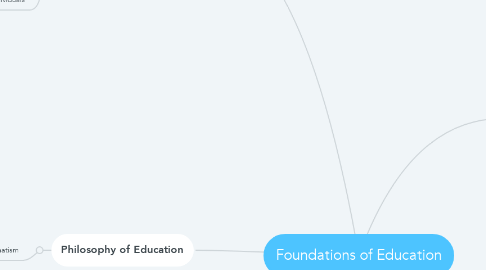
1. Sociology of Education
1.1. theoretical perspectives concerning the relationship between school and society
1.1.1. functionalism
1.1.1.1. focuses mostly on interdependence of school and society, how well they are integrated and are working together
1.1.2. conflict theory
1.1.2.1. focuses on the ability of dominant groups to impose their will on subordinate groups through force, cooptation, and manipulation, including using the school as a lever.
1.1.3. interactionalism
1.1.3.1. focuses on synthesizing and combining the functionalist and conflict theorist views of macro- and microsociology.
1.2. effects of schooling on individuals
1.2.1. employment
1.2.1.1. those who pursue and achieve a college degree will often have an easier time finding employment and higher pay
1.2.2. knowledge and attitude
1.2.2.1. those who are in higher socioeconomic schools tend to have better programs for learning, which leads to higher intelligence levels and better attitudes towards education
2. Philosophy of Education
2.1. pragmatism
2.1.1. generic notions
2.1.1.1. proposed that educators start with the needs and interests of the child in the classroom, allow the child to participate in planning his or her course of study
2.1.2. key researchers
2.1.2.1. George Sanders Pierce
2.1.2.2. William James
2.1.2.3. John Dewey
2.1.3. goal of education
2.1.3.1. providing students with the knowledge of how to improve the social order, and that it should function as preparation for life in a democratic society
2.1.4. role of the teacher
2.1.4.1. the teacher is a facilitator, who offers suggestions, questions, and helps plan and implement courses of study
2.1.5. method of instruction
2.1.5.1. individually
2.1.5.2. in groups
2.1.5.3. problem solving, or inquiry, method
2.1.6. curriculum
2.1.6.1. there is a core curriculum of math, science, history, art, reading, writing, music, etc., that would be explored through particular subject matters that would be chosen by the students
3. Schools as Organizations
3.1. The Federal Alabama Senator is:
3.1.1. Richard Shelby
3.2. The State Superintendent is:
3.2.1. Michael Sentance
3.3. The elements of change within
3.3.1. school processes are:
3.3.2. school cultures are:
4. Equality of Opportunity
5. Educational Reform
6. Politics of Education
6.1. There are four purposes of education:
6.1.1. intellectual (cognitive skills)
6.1.2. political (basic laws and patriotism)
6.1.3. social (working as one in an institution)
6.1.4. economic (preparing for future occupations)
6.2. Perspectives of the following:
6.2.1. Role of the school
6.2.1.1. Conservatives view the school as providing necessary educational training to ensure that the most hardworking and talented individuals rise to the top
6.2.1.2. Liberals view the school as providing educational training to help every student succeed equally
6.2.1.3. Radicals view the school as a place that reproduces the unequal economic conditions of the capitalist economy, and socialize the students to accept society as it is
6.2.2. Explanations of unequal performance
6.2.2.1. Conservative: Every student rises or falls on their own intelligence, using hard work and sacrifice
6.2.2.2. Liberal: Students begin life with different life chances, therefore society must attempt through policies and programs to make a more equal playing field in education
6.2.2.3. Radical: Much like the liberal perspective, students begin life with different life chances, but the change must be made for socio-economic reform instead of making policies or programs
6.2.3. Definition of Educational problems
6.2.3.1. Conservatives:
6.2.3.1.1. the decline of standards
6.2.3.1.2. the decline of cultural literacy
6.2.3.1.3. decline of values
6.2.3.1.4. decline of authority
6.2.3.1.5. immune from free market competition
6.2.3.2. Liberals:
6.2.3.2.1. schools often limit the life chances of minorities and poor
6.2.3.2.2. schools place too much emphasis on authority and discipline
6.2.3.2.3. the differences between high and low socio-economic backgrounds
6.2.3.2.4. the traditional curriculum does not include diverse cultures
6.2.3.3. Radicals:
6.2.3.3.1. racist, classist, sexist, and homophobic policies
6.2.3.3.2. policies that promote conformity, thus hiding problem in American society
6.2.3.3.3. the traditional curriculum leaves out other cultures
6.2.3.3.4. the current educational system promotes inequality of opportunity and results
7. History of U.S. Education
7.1. Reform Movement
7.1.1. The cycle of reform that followed World War II that involved both progressive and traditionalist ideas lead to the education system we use today. It was a healthy balance of increasing intellectual learning as well as social learning.
7.2. Historical Interpretation of U.S. Education
7.2.1. Democratic-Liberal School of thought interpretation
7.2.1.1. "the history of U.S. education involves the progressive evolution, albeit flawed, of a school system committed to providing equality of opportunity for all.
